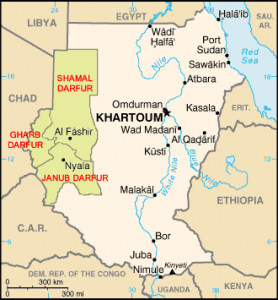by Jeff Fleischer
(Mother Jones, June 23, 2004)
This weekend marked a potential turning point in the bloody conflict that has recently engulfed Sudan (and which, notoriously, has failed to make much of an impression on the U.S. public – or the media for that matter).
On Saturday, Sudanese president Omar Hassan Bashir finally agreed to mobilize the country’s military to disarm all illegal armed groups in the western Darfur region. That includes the Arab militias – known locally as Janjaweed – that have slaughtered thousands of black Sudanese, prompting comparisons to the Rwandan genocide of 1994.
Bashir’s announcement came amid mounting pressure from the international community. Last week, the U.S. State Department threatened the Sudanese government in Khartoum with possible economic sanctions and visa denials unless it took steps to stop the killing in Darfur. The European Union announced Thursday that it would provide $14.5 million to a peacekeeping effort by the 53-nation African Union that involved 120 observers on the ground. And the United Nations Security Council passed a resolution last week that paved the way for a U.N. peacekeeping force, while Secretary General Kofi Annan publicly called on Bashir and his government to enforce the cease-fire signed April 8:
“They deny any complicity and indicated that they are going to do the best then can to bring the situation under control. I don’t have specific evidence, but from all accounts they can do something about the Janjaweed.”
After Bashir’s weekend agreement to disarm the militias, State Department spokesman Richard Boucher said the U.S. has “noted” Bashir’s stance but wants to make sure the president – who has long been accused of supporting and arming the Janjaweed – lives up to his promise:
“Certainly the United States would very much welcome the government taking action, finally, in this region to stop the attacks and to really abide by the cease-fire.”
It remains to be seen whether the Sudanese government can effectively curb the killing, or even whether it is sincere. But the obvious question remains as to why the U.S. and U.N. didn’t take action earlier. As an editorial in the Washington Post pointed out, Sudan has responded to international pressure before, perhaps most notably in expelling Osama bin Laden. But for most of its 16-month span, the slaughter in Darfur continued without strong external pressure on Bashir to stop it.
The current conflict began in February 2003, when two different groups of black rebels took up arms against the Sudanese government in an effort to gain political power. In response, the government reportedly gave the Janjaweed – which translates to “men on horses” -free reign to retaliate against black villagers in Darfur. These militias have killed between 10,000 and 30,000 people – primarily members of the Zaghawa, Fur and Masalit tribes – and displaced more than 1 million refugees.
Reporting from Sudan for the Detroit Free Press, correspondent Sudarsan Raghavan spoke with black villagers in Kailek and described the militia’s atrocities:
“According to survivors, hundreds of Janjaweed arrived in the Kailek area in early February, wielding swords and guns. They galloped from village to village, slaughtering hundreds of black Africans, all Muslims like themselves. Government soldiers in camouflage fatigues helped them.
“They razed houses, crushed mosques and tore up copies of the Koran, Islam’s holy book. They whipped women and children. Then they surrounded Kailek and took everyone hostage.
“’They asked us if we were Fur,’ said Adam Muhammed, 58, a farmer with a thick neck. ‘If you said “yes”, they shot you.’”
With more than 20 villages completely destroyed, upwards of 1 million black Sudanese have become refugees, many fleeing to neighboring Chad. As recently as Friday, Chad’s army killed 69 Janjaweed who entered Chadian territory to attack refugees.
Meanwhile, Sudan agreed earlier this month to end a 21-year civil war in the south between black Christians and Muslim forces from the north. As the Christian Science Monitor reports, both sides of that conflict agreed to a six-year transitional government, after which the southern areas will vote by referendum on whether to secede. But Robert Rotberg, a Harvard scholar on Africa, told the Monitor that agreement might have delayed action on Darfur because the international community “didn’t want to upset the peace apple cart.” Now the Darfur situation is finally being addressed, and Rotberg says it could still result in charges against Sudanese leaders for crimes against humanity.
While the crisis in Sudan received much more news coverage overseas than in America – a Lexis-Nexis search reveals about twice as many stories in English language media outside the U.S. as inside – a number of publications have long urged the Bush administration to get more involved. As the aforementioned Post editorial demanded:
“The administration’s foreign-policy plate is piled high already. But Darfur’s crisis appears worse than anything the world has seen since the genocide in Rwanda. During that tragedy 10 years ago, the Clinton administration declined to act, refusing even to recognize that genocide was occurring lest such recognition compel action. The Bush administration must not let its own record be disfigured the same way.”
But even if Bashir succeeds in disarming the militias, the humanitarian crisis is far from over. The refugees still need food, and the coming rainy season makes it difficult for aid workers to reach them. Andrew Natsios of the U.S. Agency for International Development estimates the conflict’s death toll could top 1 million if relief doesn’t reach Darfur.
The past week’s developments show a belated commitment by the U.S., E.U. and U.N. to stop the killing. Now it’s up to international relief efforts to save as many lives as they can.
Tags: daily mojo, darfur, genocide, jeff fleischer, mother jones, sudan